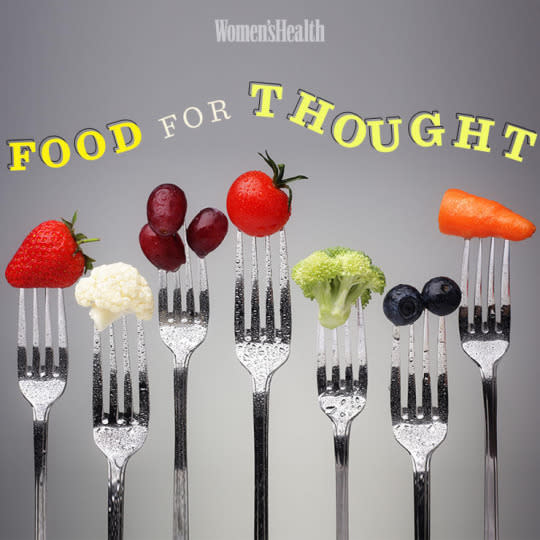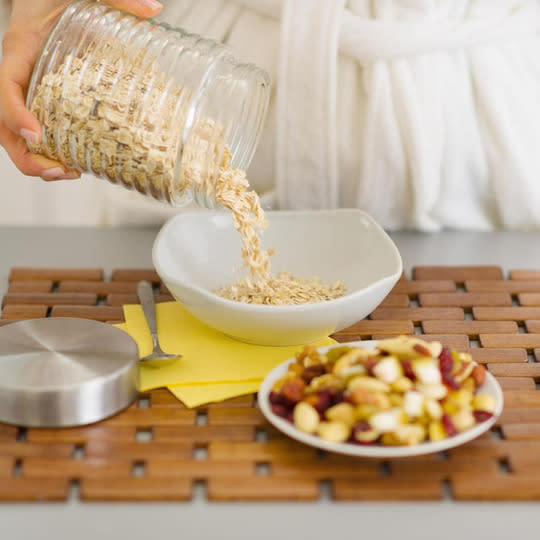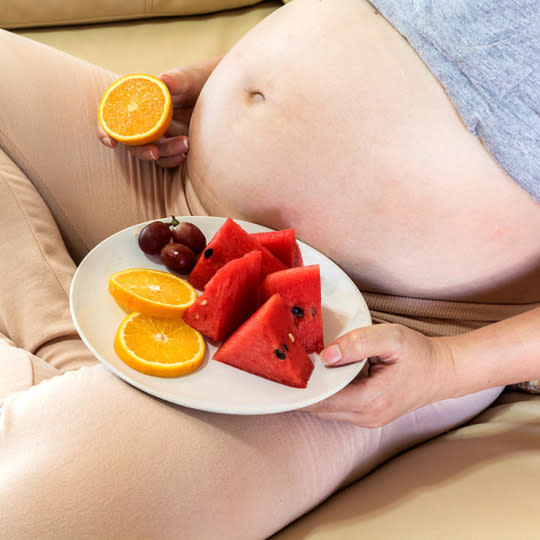18 Reasons to Eat Healthy That Have Nothing to Do with Weight Loss

Eating right is about so much more than shedding pounds. (Photo: Shutterstock)
It doesn’t matter if you want to drop a few pounds or you’re happy with your waistline as-is: Healthy eating is where it’s at. Filling up on the right foods is linked to feel- and be-better benefits, ranging from a healthier heart and brain to a lower chance of developing cancer and a higher chance of scoring that promotion. Check out our 18 favorite reasons that—no matter your weight-loss goals—you should put healthy fork to mouth.
RELATED: 10 Really Great Reasons to Work Out That Have Nothing to Do With How You Look

It Makes You Happier
While sugar- and trans fat-filled fast food and pastries can throw off your brain’s levels of mood-regulating chemicals to spur symptoms of depression, research consistently shows that health-promoting nutrients—such as creatine, an amino acid found in grass-fed beef, omega 3’s from fatty fish, and vitamin D in dairy—can boost your mood and combat depression.

It Makes You Smarter
Brain foods are right. Research from the Rush Institute for Healthy Aging shows that putting away a lot of saturated and trans fats from fried and processed foods reduces your cognitive abilities—and even shrinks your brain—over the years. Meanwhile, high intakes of omega 3’s from foods like fish, walnuts, and avocados translate into bigger, better functioning brains.

It Helps You Set New PRs
In case you haven’t gotten the message, we’ll say it again: Food is fuel. While research published in Sports Medicine shows that a pre-workout snack of carbs can boost your performance in both endurance and high-intensity interval workouts, every one of your dietary decisions throughout the day impact your exercise performance, according to Physicians Committee for Responsible Medicine. Consistently getting the hydration, vitamins, and minerals you need keeps your body primed and ready to work its best.

It Scores You Better Sleep
While getting a good night’s sleep will help you health-ify your plate, eating right will also help you catch the Zs you really crave, according to 2013 research published in Appetite. In the study, University of Pennsylvania researchers found that people who ate the widest variety of foods as well as the most antioxidants. They also drank the most water.

It Helps Keep Your Ta-Tas Healthy
When it comes to preventing breast cancer, healthy foods are where it’s at. For instance, mushrooms help keep your estrogen levels in-check to prevent breast cancer, especially hormone-dependent tumors, according to research in Nutrition and Cancer. Bonus: They inhibit cancer cell activity to slow tumor growth.

It Slashes Stress
Foods have a huge influence on your levels of chillaxing neurotransmitters such as serotonin and dopamine as well as your levels of stress-inducing hormones such as cortisol and adrenaline. For instance, in one 2014 Journal of the American College of Cardiology study, people who ate flavonoid-rich dark chocolate before undergoing a mock interview came out on top with lower levels of adrenaline.
RELATED: The 11 BEST Foods to Eat When You’re Stressed Out

It Fights Off Inflammation
Inflammation is linked to everything from stress and brain fog to diseases such as heart disease and cancer. But according to research published in The American Journal of Clinical Nutrition, people who eat whole grains over refined ones cut their levels of C-reactive protein—a key indicator of inflammation—by 38 percent. And, FYI, that was after controlling for weight loss (because we aren’t talking about weight loss here!).

It Boosts Your Immunity
If you’d rather play hooky than spend your “sick days” in bed with the sniffles, it’s time to pay attention to your plate. 2013 research in the journal Current Topics in Microbiology and Immunology shows that keeping your gut bacteria happy and healthy (reach for probiotics and complex carbs!) can strengthen your immune system to reduce your likelihood of infections. And research in BMC Complementary & Alternative Medicine shows that green tea can help fight off the flu this season.
RELATED: What Nutritionists Eat for Every Kind of Ailment

Women nowadays are more likely to die from heart disease than from anything else. Luckily, all weight loss aside, eating right can help cut your risk. For instance, one New England Journal of Medicine study found that people who eat about a handful of nuts every day were 29 percent less likely to die from heart disease. Yaaaaas!

It Keeps You Strong
Eating nutrient-rich (and especially protein-packed) foods are critical to keeping your muscles strong so that you can do whatever it is you want to do, whether that’s bench pressing your body weight or taking the stairs at age 70. To keep your muscles strong now and as you age, a 2015 review published in Applied Physiology, Nutrition, and Metabolism suggests that most woman put away between 25 and 35 grams of protein at each meal. FYI, a cup of Greek yogurt contains about 23 grams and a 4-ounce serving of chicken breast packs 26.

It Makes Your Future Children Healthier
What you eat doesn’t just affect any buns currently residing in your oven. According to 2015 ob-gyn guidelines from the International Federation of Gynaecology and Obstetrics, what you eat throughout your entire life—and even during your childhood—affects your fertility and future baby’s health. So lay off the fried foods and start eating fresh.

It Prevents Osteoporosis
Strong diet = strong bones. Apart from filling up on dairy, the National Osteoporosis Foundation recommends noshing on fish, fruits, and veggies. It also states that getting your sodium intake into a healthy range (a.k.a. nixing processed foods) can help ward off osteoporosis.

It Lengthens Your Life
If you haven’t guessed by now, all of these benefits add up to a longer life. So much so that a 2014 Journal of Epidemiology & Community Health study found that people who eat seven or more daily servings of fruit and vegetables are 42 percent less likely to keel over on any given day compared to people who eat little to no produce.

It Makes You More Productive
Want a raise? Sure you do! Luckily, when researchers from Brigham Young University studied 19,800 workers, they found that people who ate well day in and day were about 66 percent more productive than were junky eaters.

It Helps You Stay “Regular”
What you eat, the bacteria living in your gut eats later. And those little doodads in your digestive tract have a huge effect on your bathroom habits. According to research presented at the Gut Microbiota for Health World Summit, to keep things moving, you should feed the bacteria lots of fruits, veggies, and probiotic-rich dairy products like Greek yogurt. Oh, and you’ll want to avoid greasy and fried foods.

It Helps Prevent Eye Problems
What you eat plays a profound role in preventing two common eye problems: cataracts and age-related macular degeneration. It may be because the eyes are prone to free-radical damage, which healthy foods are awesome at fighting. Harvard Medical School recommends reaching for antioxidant-rich foods such as produce, herbs and spices, red wine, and green tea.

It Keeps Your Skin Healthy
Your skin is the largest organ in your body, so it only makes sense that it benefits from what’s on your plate. Apart from protecting against free-radical damage to prevent wrinkles and age-spots, research presented at the 2015 meeting of the American Society of Clinical Oncology shows that people up their vitamin intake cut their chances of developing skin cancer by 23 percent.

It Boosts Your Energy
Vitamin D—along with a host of B vitamins—are famous for supporting healthy energy levels. But paying attention to macros can also go a long way toward fighting 3 p.m. slumps and staying revved throughout the day. By making sure you consume healthy fat and protein along with each batch of (hopefully whole) carbohydrates, you can keep your blood sugar from wavering and your energy levels from plummeting, according to research published in Diabetes Care.
More from Women’s Health:
When Do Your Leftovers REALLY Need to Be Tossed?
How a Nutritionist Decides if a Snack Is Good for You
See What 9 Nutritionists Eat for Lunch on the Reg